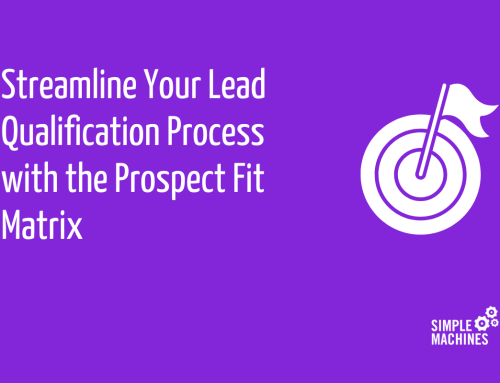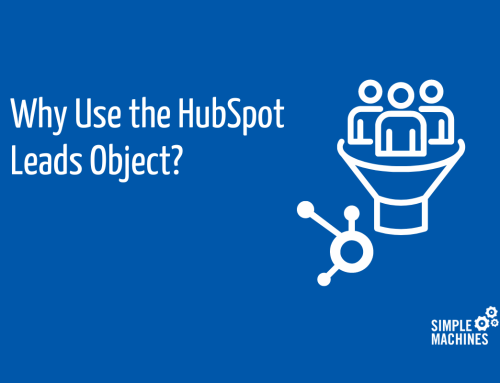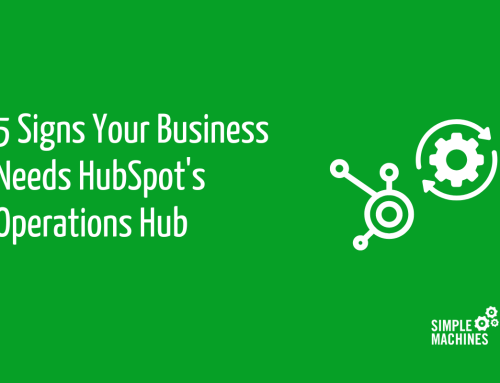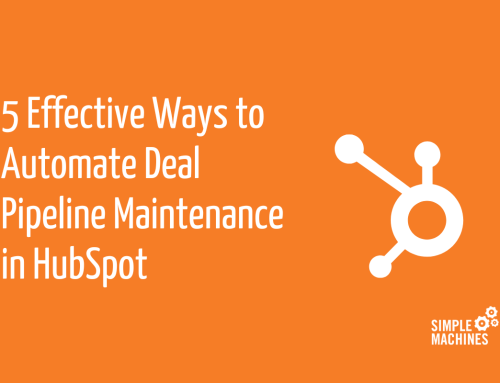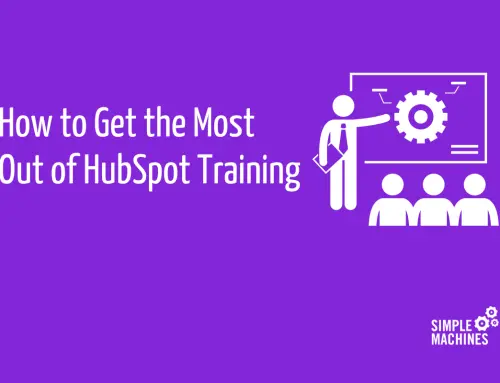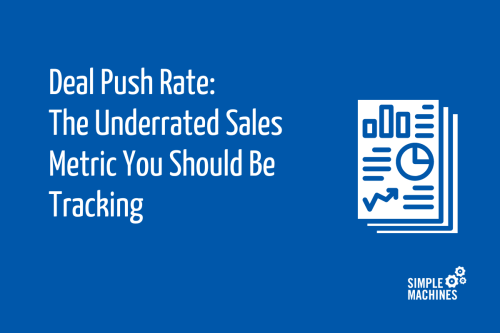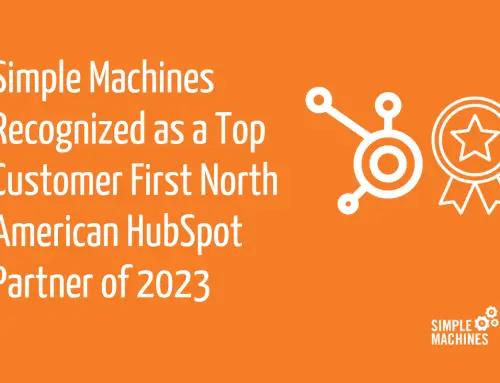While HubSpot began as a marketing automation tool designed primarily for small businesses, today, HubSpot stands as a true enterprise-grade Customer Relationship Management (CRM) platform.
As the platform has expanded its capabilities and grown in complexity, so too has the challenge of harnessing its full potential. Yes, many of the new features, tools and AI enhancements make it simpler and faster to accomplish specific tasks, but there’s a growing list of those tools to track and understand their implications. Easier to do stuff – and easier to break stuff.
If there isn’t one person serving as the ultimate HubSpot gatekeeper and use of the technology is more of a free-for-all, the risk of ending up with crossed wires, inaccurate data and an unmanageable rat’s nest of a CRM is high – and many businesses have learned this the hard way. According to a survey by Validity of over 600 organizations, 44% of respondents said they lose over 10% in annual revenue due to low-quality CRM data.
Against this backdrop, the interest and demand for HubSpot admins has naturally grown.
In this post, we dive into the HubSpot admin role, how to know if your business needs one and the potential benefits of outsourcing the role.
What is a HubSpot admin?
As the title suggests, a HubSpot admin (or HubSpot Administrator) is the person in charge of managing a company’s HubSpot instance. While they’re probably not the only person using HubSpot, it is their job to maintain a clean and functioning portal that’s configured to support all users and teams who rely on HubSpot to do their jobs.
The specifics of this person’s role will vary greatly depending on the size, maturity and complexity of the business and its usage of HubSpot. For smaller businesses this could be a part-time or fractional role mostly focused on data management, or for bigger companies, it could be a full-time expert who manages everything from automation, integrations, training and new feature testing.
With more complex instances and configurations, the needs and requirements demanded of the admin increase. In other words, a global company with marketing, sales, service and operations all depending on HubSpot as a source of truth doesn’t just need an admin who can de-duplicate contacts and purge hard bounces – they need someone who possesses a profound grasp of Revenue Operations (RevOps), comprehends the intricacies of HubSpot account settings, security and permissions and understand how to support and align all teams to streamline processes and drive growth. Not a small job!
The evolving role of the HubSpot admin
In HubSpot’s early days, the role of the admin primarily revolved around overseeing the basics: managing contacts, setting up email campaigns and ensuring data accuracy. Today, a HubSpot admin is not just a gatekeeper of data; they’re often a strategic asset for an organization.
Here’s how the role has evolved:
From technician to strategist: At first, the HubSpot admin was often seen as a technician, proficient in the technical aspects of HubSpot but perhaps lacking the strategic insight to align it with broader business objectives. Now, they’re more likely to be considered part technician and part strategist. They must understand not only how to use HubSpot’s tools but also how to craft and execute data-driven marketing, sales and service strategies.
Keeping pace with HubSpot’s continuous updates: HubSpot is always improving and regularly rolling out updates and new features. The effective HubSpot admin must stay on top of these changes, assessing how they can benefit the organization and implementing them effectively. They’re no longer just administrators; they’re change agents who ensure their company is taking advantage of new advancements.
Mastering revenue operations (RevOps): As organizations seek to align sales, marketing and service operations for greater efficiency, the HubSpot admin has expanded their knowledge beyond their specific domain. They’re now well-versed in the concept of Revenue Operations (RevOps), understanding how different departments can work together seamlessly to enhance the customer journey and drive revenue.
Customization and automation: While basic tasks like email campaigns remain important, the role has expanded into customization and automation. HubSpot admins are now expected to be experts in creating tailored experiences for leads and customers, utilizing the platform’s automation capabilities to nurture leads, segment audiences and provide personalized content.
Data analysis and reporting: The modern HubSpot admin is also an analyst. They not only collect data but analyze it to derive actionable insights. This data-driven approach enables better decision-making, as admins can identify what’s working, what needs improvement and where to allocate resources for the greatest impact.
Training and cross-functional collaboration: Beyond their own expertise, HubSpot admins are also often depended on as educators and collaborators. They may train teams across the organization on HubSpot best practices and help align sales, marketing and service teams, ensuring everyone is on the same page and working toward common goals.
In essence, the evolving role of the HubSpot admin is no longer confined to managing a tool but extends to shaping the entire customer experience, ensuring scalability and driving constant organizational improvement.
Do you need a HubSpot admin?
Here are some telltale signs that your company may benefit from having a dedicated HubSpot admin:
Overwhelmed marketing and sales teams: If your marketing and sales teams find themselves overwhelmed by the sheer volume of data, campaigns and leads in HubSpot, it’s a sign that a dedicated admin could streamline processes and provide much-needed support.
Inefficient workflows: Are your marketing and sales workflows convoluted or not delivering the expected results? A HubSpot admin can troubleshoot and optimize these workflows, automating repetitive tasks and ensuring that leads move seamlessly through the sales funnel.
Data discrepancies and quality issues: Data accuracy is critical for any business. If you’re experiencing a problematic amount number of discrepancies, duplicates or data quality problems, a HubSpot admin can implement data governance practices to maintain a clean and reliable database.
Missed opportunities for personalization: Personalization is key to engaging today’s customers. If you’re missing opportunities to tailor content and communications to individual leads, a HubSpot admin can help you leverage HubSpot’s personalization features effectively.
Struggling with lead nurturing: Effective lead nurturing requires a well-orchestrated series of emails and touchpoints. If your lead nurturing campaigns aren’t delivering results, a HubSpot admin can revamp them for better engagement and conversion rates.
Limited reporting and analytics: If your reporting and analytics are basic or lack the depth needed for informed decision-making, a HubSpot admin can create custom reports, track key performance indicators (or KPIs) and provide actionable insights to drive strategy.
Integration challenges: Integrating HubSpot with other tools and platforms can be complex. If your organization struggles with integrating HubSpot seamlessly with your CRM, website or other systems, a HubSpot admin can ensure data flows smoothly and automations work as intended.
High turnover of HubSpot knowledge: Does your business frequently experience staff turnover, leading to a loss of HubSpot expertise? A HubSpot admin provides continuity, ensuring that your HubSpot instance remains optimized despite turnover.
Difficulty scaling operations: As your company grows, so do your marketing and sales needs. If you’re finding it challenging to scale your HubSpot operations to meet increased demands, a HubSpot admin can develop scalable processes and strategies.
Inadequate training and onboarding: If new team members struggle to get up to speed with HubSpot or if there’s a lack of formal training and onboarding processes, a HubSpot admin can bridge the knowledge gap and ensure everyone is using the platform effectively.
Outsourcing the HubSpot admin role to a solutions partner
While having an in-house HubSpot admin is the right option for many companies, it’s not the only option. For some, outsourcing the HubSpot admin role to a solutions partner offers a number of distinct advantages.
Here are a few reasons why this approach can be a better fit:
Access to expertise: Probably the biggest benefit to hiring a proven HubSpot solutions partner to administer your HubSpot is the access to expertise. Rather than relying on someone to learn on the job, you can tap a bench of specialists who know the platform inside out, are aware of the upstream effects and “gotchas” to consider with each decision and whose job it is to stay on top of the latest upgrades and feature releases. Be sure to ask a potential solutions partner what certifications their team holds – the good ones will be highly certified and will have completed the more advanced courses, not just the introductory certifications.
Cost efficiency: To hire a full-time in-house HubSpot admin you’ll need to account for not only salary but also benefits, training and any infrastructure needed to support this person. On the other hand, outsourcing to a solutions partner will typically be more cost-effective, as you’re just paying for the services you need without the overhead.
Scalability and flexibility: Outsourcing allows you to scale up or down as needed. If your needs change, you can easily adjust your partnership with a solutions provider without the complexities of hiring, training or letting go of employees.
Immediate availability: Finding and onboarding an in-house HubSpot admin can be a time-consuming process. Solutions partners are ready to go from day one, reducing the time it takes to start realizing the benefits of HubSpot.
Breadth of services: A majority of solutions partners offer a broader range of services beyond HubSpot administration. For example, Simple Machines helps many clients with website design and development and revenue operations.
Enhanced collaboration: Solutions partners work with multiple clients and often bring a wealth of industry insights and best practices to your organization.
Reduced dependency risk: In the past few years, employee retention has been a big challenge for businesses in many industries, and relying on a single in-house HubSpot admin can create a dependency risk. If that person leaves the company or goes on leave, it can disrupt your operations. Solutions partners mitigate this risk by providing continuity through their team.
Focus on core competencies: By outsourcing HubSpot administration, your in-house teams can focus on their core competencies rather than splitting their attention between their primary roles and managing HubSpot.
Compliance and security: A savvy solutions partner will be well-versed in data security and compliance, ensuring that your HubSpot operations align with industry regulations, reducing risk and legal liabilities.
Next steps
Ultimately, by considering if your business needs a HubSpot admin and – if so – whether to hire in-house or outsource to a solutions partner, you’re taking an important step in assessing how the platform can best serve your business.
Curious to learn more about what it’s like to work with a solutions partner? Give us a shout.

